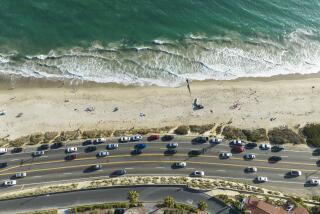Runoff Tied to Offshore Bacteria : Ecology: Officials take steps to divert water that may be contaminating surf off Huntington Beach. More shore is opened.
- Share via
Urban runoff, rather than a leaky sewage pipe, may be causing high levels of bacteria in the surf off Huntington Beach, officials said Tuesday.
Experts are still examining every possible explanation for the bacterial contamination that has closed miles of shoreline and spoiled much of the summer season in Huntington Beach. But they also took steps Tuesday to divert more than a million gallons a day of runoff, much of it from a downtown hotel construction site that has been dumping into the ocean.
Public health officials on Tuesday meanwhile reopened another of section of beach that has been shut since July 1, from the city pier north to 10th Street.
Orange County health director Jack Miller said the reopening is possible because bacteria readings north of the pier have been negligible for several days. A “buffer zone” will be kept closed south of the pier toward the area where the highest readings have been detected.
Mayor Peter Green and other officials welcomed the latest opening, which could restore some life to the beach and adjoining businesses for the busy Labor Day weekend. “I hope that very soon we can open the entire beach,” said Green.
But health officials said about three miles of beach to the south, including Huntington Beach State Park, will remain closed, with heavy monitoring to continue along the city’s entire coast.
For weeks, investigators have been looking for sewage leaks that might explain the contamination. But they were sent in a different direction last week after discovering high pollution readings at city and county pump stations that send runoff through Talbert Marsh and into the ocean. The pumps were shut off Thursday.
On Monday, crews dumped dozens of oranges and grapefruits from a boat into the Talbert Marsh to track their direction. The runoff theory received a boost after the fruit ended up in the area off the state park where runoff normally flows.
“Son of a gun if the things didn’t come out right at the ‘hot spot’ where the highest levels of bacteria have been detected,” said Orange County Sanitation District technical director Robert Ghirelli, who is heading a multi-agency task force to solve the crisis. “I think we have circumstantial evidence” pointing to the source, he said.
The marsh is at the end of a flood control system and handles “anything that goes into gutters from your house or a business,” said Ghirelli, such as animal feces, grass clippings loaded with pesticides, and gas station discards.
Construction of a Hilton hotel in downtown Huntington Beach may have unintentionally aggravated the runoff problem, he said, with a million gallons of water being pumped daily from the site to allow underground building. The water could be flushing unusually large amounts of runoff into the ocean, Ghirelli said.
While weary sanitation and public health officials say that the cause of the pollution may never be known, they have begun implementing a strategy based on treating runoff.
This week flow from four pumps will be diverted to a sewage treatment center near the marsh for treatment and discharge farther out in the ocean, away from the beach.
Ghirelli cautioned that people should not feel free to dump at will into storm drains. Diverting the storm water will only work during the dry season; during rainy winters it will simply not be able to handle the flow.
“But at least people don’t go swimming then,” he said.
Times correspondent Judy Silber contributed to this story.
More to Read
Sign up for Essential California
The most important California stories and recommendations in your inbox every morning.
You may occasionally receive promotional content from the Los Angeles Times.













